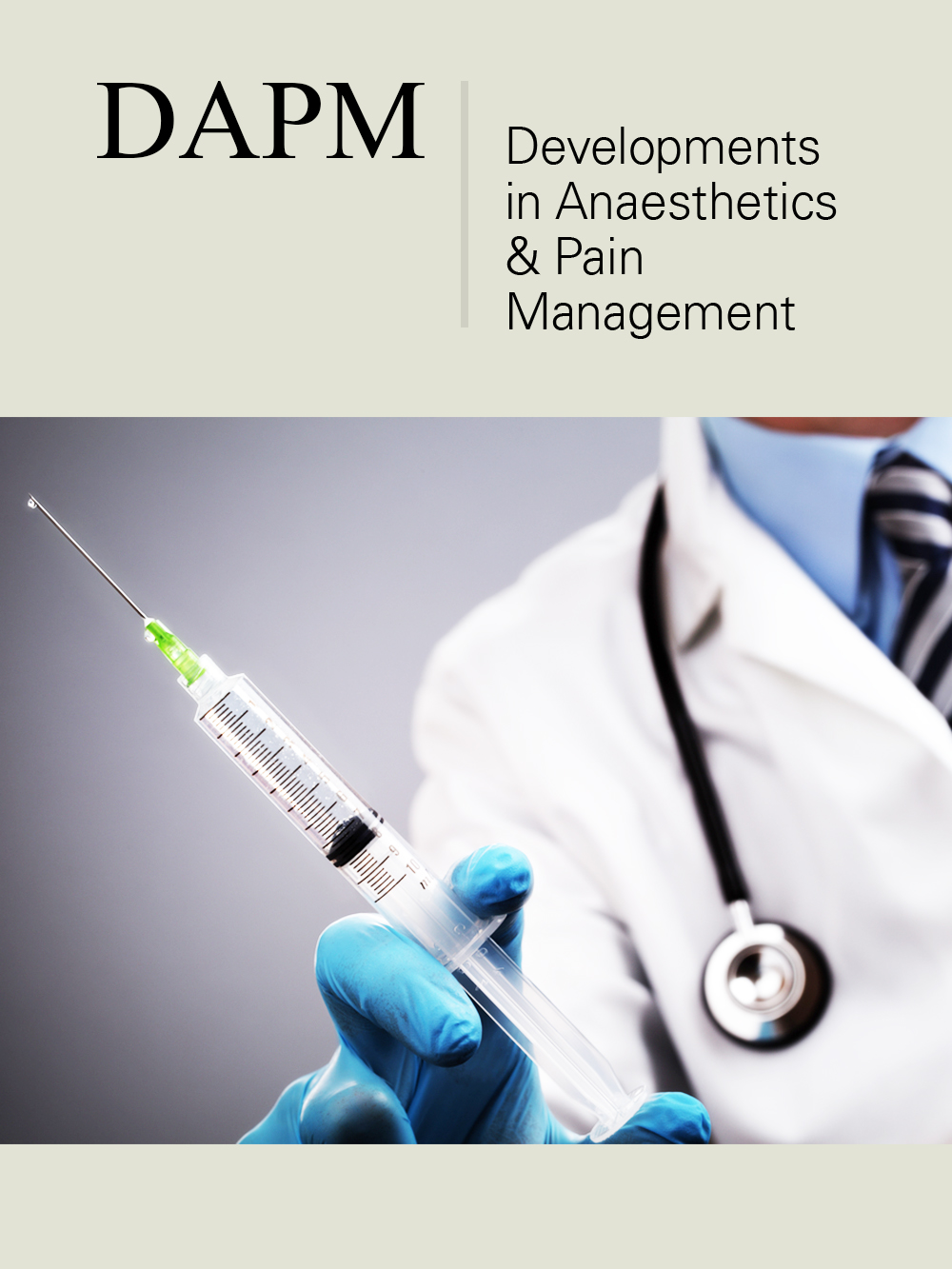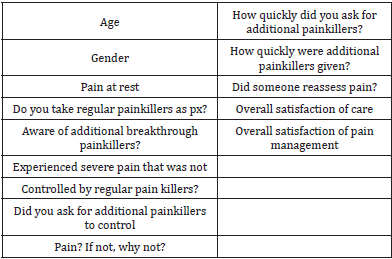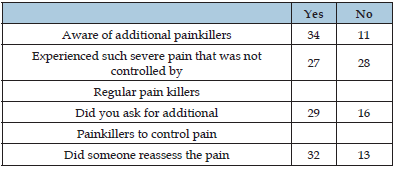- Submissions

Full Text
Developments in Anaesthetics & Pain Management
Does the Morale of Nursing Staff Affect Delivery of Effective Pain Management?
Peter MC Indoe*
Horton General Hospital, United Kingdom Introduction
*Corresponding author: Peter MC Indoe, Horton General Hospital, United Kingdom
Submission: August 09, 2021;Published: August 26, 2021

ISSN: 2640-9399 Volume2 Issue2
Abstract
Introduction: Staff working throughout the pandemic have been significantly affected by the impact of COVID-19 which has led to impacts upon their morale and increased rates of burnout, this has been particularly seen within nursing staff [1]. In view of this impact upon morale, we sought to establish whether the morale of nursing staff affects the delivery of effective pain management in post-surgical patients.
Method: We conducted a qualitative study involving 45 nursing staff and 45 patients examining the morale of nursing staff, their experience and understanding of the delivery of pain relief together with patients’ need for pain relief, the assessment of their pain relief and the satisfaction levels of their pain control.
Result: The results indicate that the majority of nursing staff were satisfied with their job. Of the ones not satisfied with their jobs they often felt unsupported and were at increased risk of burnout. However, their job satisfaction and morale did not correlate with patients’ satisfaction with pain relief.
Discussion: The results from this study indicate that even if nursing staff are suffering from low morale, this does not impact negatively on the post-operative pain relief care they deliver for their patients. However, this was a small study, and it may be that as the impact of the pandemic becomes more apparent; the subsequent effect upon the medical and nursing workforce particularly in relation to morale and burnout may negatively impact patient care if burnout and workforce morale in the health system is not addressed.
Keywords: Pain; Morale; COVID; Management; Treatment
Introduction
Currently nursing staff morale is estimated to be at an all-time low due to COVID [2]. The consequences of this are likely to be increased rates of burnout, reduced retention, and potentially worsening patient care [3]. Nursing staff have worked tirelessly throughout the pandemic and the consequences of this have understandably led to feelings of lower morale coupled with increased rates of burnout. Pain is a manifestation of various physiological and psychological factors that requires urgent relief [4]. Administration of timely pain relief and its effect on both patient care and recovery is essential. If pain relief is delayed, this can have an impact on how quickly patients are able to engage with their post-operative rehabilitation, therefore timely administration is essential to ensure a patient’s recovery. When people’s morale in a job is low, their performance often suffers as a consequence [3]. In medicine this can have significant effects on patient care and their subsequent post-operative recovery. Our study sought to identify whether there was any correlation between nursing staff morale and pain relief administration in the post-operative surgical population. As a result, we hypothesized that reduced levels of morale within nursing staff would correlate with lower levels of pain relief and lower rates of appropriate delivery of adequate pain medication delivery post op.
Method
We undertook this qualitative study at a district general hospital. We surveyed 45 patients and 45 nursing staff over a two-week period on post-operative surgical wards requiring post-operative pain relief. We investigated several areas regarding nurse morale, features of burn out and prescribing of appropriate pain relief. The following criteria were examined from a patient perspective and from a nursing perspective (Table 1 & 2).
Table 1: Areas assessed in patient perspective of pain relief administration.

Table 2: Areas assessed in nursing perspective in regard to pain administration and morale.

Result
The patients assessed included a wide range of ages from
18 to 98. The majority of patients reported taking their regular
analgesia always. 34 were aware of additional painkillers, 11 were
not. Most patients (29) had to ask for additional pain relief on
top of their regular analgesia to control their pain. The majority
reported that when they asked for additional pain relief it was
delivered immediately. Seven patients reported a little delay, and
one reported a moderate delay. All patients reported that their pain
was reassessed. Patients’ satisfaction of care and pain management
were either satisfied or very satisfied (Table 3).
From the results, we found that the job role or experience of
nursing staff was not linked to a specific decline or change in morale
or risk of burnout. The majority of nurses were either satisfied or
very satisfied with their career choice. Only two nurses reported
feeling burnt out. Of the nurses that appeared to be suffering low
morale and possible burnout, this appeared to be in the context of
feeling unsupported at work. All nursing staff were confident at
assessing pain and were aware of the need to reassess pain. There
were some discrepancies in how frequently they assessed and reassessed
pain ranging from 10 minutes to one hour. This could be
accounted for by the patients that they were looking after but could
also be related to varying opinions as to how frequent pain should
be reassessed. The most challenging group of patients to assess pain
relief in was the intravenous drug user populations as it was difficult
to accurately assess their score and/or the most appropriate pain
medication post operatively. Statistical analysis was carried out
using a Pearson’s rank correlation analysis. The correlation analysis
suggested that there was no correlation (R -0.11) between nursing
staff morale, job satisfaction and its link with timely administration
of pain relief and pain satisfaction scores.
Table 3: Results of patient experience of pain relief administration post operatively.

Discussion
The current study supports other studies [3] that nursing
staff, regardless of their current morale, continue to do the best
that they can for their patients and those lower levels of morale
do not correlate with reduced delivery of pain relief. The results
highlight that the majority of nursing staff are satisfied with their
jobs, regardless of whether they are currently experiencing low
morale. The study provides further evidence of the dedication of
nursing staff to their patients and their importance to the delivery
of care in the health service. The study had a number of limitations.
Firstly, it was a relatively small study, and it may be that with larger
numbers of both nursing staff and patients there would be higher
rates of low morale among nursing staff, which may lead to reduced
delivery of timely pain relief. Secondly, this study was conducted at
a district general hospital.
If this was carried out at a tertiary centre, there is a higher
likelihood that greater rates of burnout and low morale may be
encountered leading to impacts upon patient care and subsequent
pain relief administration. Thirdly, pain relief and pain scoring
are extremely subjective and dependent on the individual patient.
Therefore, there is a possibility that less or more stoical patients
may have asked for more or less pain relief respectively. Fourthly,
due to the period in which this research was carried out, it is
possible that during those weeks, the patient population and the
operations involved may not be further representative of the pain
relief required and subsequent impact of nurse delivery of patient
relief may not be representative. Further the nursing staff working
during that two-week period may again not be representative of the
wider nursing population or the other nurses not on shift during
that two-week period. Overall, this study indicates that nursing staff administer timely pain relief medication to their patients
regardless of the level of morale of the workforce.
However, this does not negate the fact that nursing staff are
under extreme pressures to deliver high quality care at all times
and the impact of the COVID pandemic upon their morale has had a
significant impact. Further there are increasing studies suggesting
that the impact of moral injury upon staff working in the health
service, as a consequence of the COVID-19 pandemic is likely to be
high and this will only become apparent over the next few years
[5]. Therefore, it is highly likely that although nursing staff continue
to do their best for patients. In the future, if burnout, moral injury,
working conditions and staff morale are not addressed, then this
could have a negative impact upon patient care including their
management of pain relief post operatively.
References
- Yahya AS, Khawaja S, Chukwuma J (2020) Staff morale and well-being during the COVID-19 Prim Care Companion CNS Disord 22(3): 20com02645.
- Stuijfzand S, Deforges C, Sandoz V, Sajin CT, Jaques C, et al. (2020) Psychological impact of an epidemic/pandemic on the mental health of healthcare professionals: A rapid review. BMC Public Health 20(1): 1230.
- Numminen O, Katajisto J, Kilpi LH (2019) Development and validation of nurses' moral courage scale. Nurs Ethics 26(7-8): 2438-2455.
- Ramachandran G, Sangineni DKS, Kiran T, Polapally V (2020) Pain relief is not optional-Choose Indian Journal of anaesthesia 64(6): 453-455.
- Sriharan A, West KJ, Almost J, Hamza A (2021) COVID-19-related occupational burnout and moral distress among nurses: A rapid scoping review. Nurs Leadersh (Tor Ont) 34(1): 7-19.
© 2021 Peter MC Indoe. This is an open access article distributed under the terms of the Creative Commons Attribution License , which permits unrestricted use, distribution, and build upon your work non-commercially.
 a Creative Commons Attribution 4.0 International License. Based on a work at www.crimsonpublishers.com.
Best viewed in
a Creative Commons Attribution 4.0 International License. Based on a work at www.crimsonpublishers.com.
Best viewed in 







.jpg)






























 Editorial Board Registrations
Editorial Board Registrations Submit your Article
Submit your Article Refer a Friend
Refer a Friend Advertise With Us
Advertise With Us
.jpg)






.jpg)














.bmp)
.jpg)
.png)
.jpg)










.jpg)






.png)

.png)



.png)






